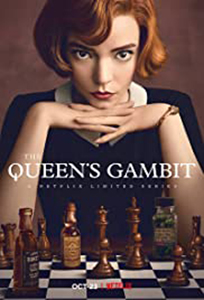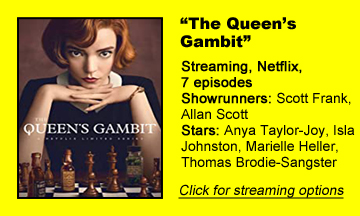There’s no new season of “The Marvelous Mrs. Maisel” this year, but “The Queen’s Gambit” (Netflix) has us covered like a pawn wall protecting friendly pieces. The miniseries based on Walter Tevis’s 1983 novel takes us to the 1950s and 1960s in all their pastel and analog glory to tell a fictional story set against a real-world backdrop.
Indeed, your only lament coming out of these seven episodes might be that there wasn’t a real Beth Harmon (Anya Taylor-Joy) who took the chess world by storm.
Obsessive Beth
Creators Scott Frank (“Logan”) – who writes and directs every episode — and Allan Scott (“Don’t Look Now”) craft a masterpiece wherein chess stands in for any avocation someone is passionate for. I know next to nothing about chess, so I can’t speak to the accuracy or intricacies shown on screen.
But “The Queen’s Gambit” communicates Beth’s obsession, the intensity of the top-level tournaments, and its popularity around the world – especially in the Soviet Union, where matches are broadcast on the radio.
Taylor-Joy (having a heckuva year, also starring in “Emma” and “The New Mutants”), Isla Johnston (as young Beth) and the writers give us a thorough look at Beth, who plays out chess moves in her head, visualizing them on the ceiling of her Kentucky orphanage dorm.
Perhaps mildly autistic (although the series never hints at a diagnosis, which makes sense for the time period), Beth gives off an enigmatic air that effortlessly attracts all kinds of men once she grows up and gets pretty.
It’s just plain entertaining to watch her destroy unsuspecting male chess nerds at the board. And then we can imagine their off-screen confusion over also being attracted to her for – at least in part — her mind.
From orphan to celebrity
Because we’re with Beth from the harsh orphanage through her worldwide success, “The Queen’s Gambit” makes clichés personal and fresh again. It’s sometimes like a Spielberg or Zemeckis film in the way it’s unashamed to hit the broad beats.
For example, even when she gets adopted and placed in a public school, it’s not the chance to exhale we might’ve thought: She’s now the social outcast. As classmates sway to The Vogues’ “You’re the One” – a bit that had me thinking of Meg Pryor and “American Dreams” – Beth is thinking of chess strategies.
Well, in that moment, she’s actually thinking about getting a drink. I like Frank’s decision to show Beth as high-functioning and reasonably well-adjusted 90 percent of the time. When she hits rock bottom with her alcohol and pill addictions, it has more impact by only taking up a small chunk of storytelling time.
Midcentury aesthetic
Similar to “Maisel,” “Gambit” is loaded with actors who effortlessly embody the midcentury aesthetic. (Obviously, a huge nod goes to hair, makeup and wardrobe, too.) There isn’t a single character who falls flat, even if it’s one of Beth’s rigid communism-bred opponents.

Marielle Heller is fascinating as the adoptive hypochondriac mom who uses and enables Beth, yet never comes off as a monster. And Moses Ingram provides spice – especially in the dour orphanage – as Beth’s friend Jolene, whose blackness is relevant to the themes (she has no chance of getting adopted) but not to their friendship.
While the message that women can do anything can’t be dodged (but nor is it overplayed), “Gambit” has a deep roster of men. Mr. Shaibel (Bill Camp), the gruff custodian with a buried heart of gold who teaches Beth chess, is one of those clichés that I embraced anyway.
The boys – all chess nerds — in Beth’s life run a fascinating gamut. We can see Harry Beltik (Harry Melling) loves her, and I appreciate the nobleness with which he departs, realizing that it’s a one-way thing.
Benny (Thomas Brodie-Sangster, who resembles David Spade plus suaveness) is the Lenny Bruce to Beth’s Mrs. Maisel, and I love the final moment of one episode where he says “Oh, and about sex? It’s not happening.” It allows the show to dodge the sexual tension while also making them sexier together.
Shipping Townes
And then there’s Townes (Jacob Fortune-Lloyd), a chess reporter for the Lexington Herald-Leader. (Yes, “Gambit” slightly overplays the popularity of this game, but always with the aim of creating a magical slice of an otherwise dour pie.)
We hardly need Beth to tell a gal pal over drinks that Townes is her true love – the one she’d like to “trade rooks with,” in schoolgirl parlance – but it sure is cute when she does. “Gambit’s” ultimate handling of the Beth-Townes relationship is already inspiring internet essays.
Jokes will be made about how it’s such a bizarrely 2020 thing that a period piece about chess is a bingeworthy hit. But chess is merely a wonderful stand-in for whatever you want. I’m not inspired to learn the game after watching this series – in part because it seems so over my head after watching Beth and other masters ply their trade (and I’ve always been a Scrabble guy).
But I do appreciate the passion of a small circle of people who can’t have careers at the game (even at the height of its popularity, it ain’t exactly golf or tennis), yet can’t let it go. More importantly, as it adds color to a black-and-white game, “The Queen’s Gambit” makes its enigmatic central player into a full person.


